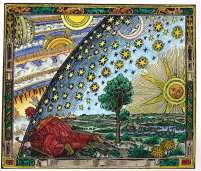As the religion of Wicca becomes more popular, a greater portion of the population is more likely to encounter it in one
form or another. There are books describing Wiccan practices even in mainstream bookstores, there are sites devoted to sharing
the Wiccan religion (as well as tearing it down) all over the Internet, and the majority of us have probably encountered the
idea of Wicca on TV or in a movie. With the growing popularity of Wicca as a religion, many of us will probably encounter
more and more Wiccas just in our day to day lives.
Since Wicca is becoming more and more prevalent and more accepted, it's a good idea to be informed about what Wicca is
and what Wiccas stand for. First of all, while Wicca is another name for Witchcraft and technically followers of the religion
can be called witches, the name "Wicca" was chosen in order to distance the religion from the common association that witchcraft
has with Satanism, human sacrifice, and consorting with demons. While these associations are widespread, they have their basis
in propaganda spread over the course of the second half of the second millennium by Christian churches and the budding medical
establishment as they tried to undermine Witchcraft as a religious belief and a resource for medicine, respectively.
In reality, Witchcraft- especially in the modern form of Wicca- is extremely benign due to its core beliefs. One of the
main tenets of Wicca is "Harm None." Much like the Hippocratic oath which states "First do no harm," one of the fundamental
beliefs of Wicca is that it's wrong to do harm to others. This clearly prohibits the sacrifice of humans and other animals,
casting malicious spells, as well as a variety of other things that other religions and the medical profession don't have
any moral objection to.
Another basic tenet that reinforces Wicca's benign nature is the "Law of Three" which states that anything that we send
out into the world returns to us multiplied by three. This means that Wiccans are extremely generous with positive things
and very hesitant to do harm to others. Belief in this boomerang effect is a clear deterrent to a lot of the behavior that
the Witches of old were accused of.
Another interesting fact about the religion of Wicca is that, far from worshiping Satan, its adherents don't even believe
in the existence of Satan. Instead of seeing the world as having good and evil forces in it, Wiccans believe that the supernatural
forces in the universe are neutral and that people can choose to use these forces for either good or evil.
Another tenet of Wicca is religious freedom. This one comes more from the persecution that nature worshipers have faced
over the centuries than any fundamental religious belief. This ideal of religious freedom deters Wiccas from evangelizing,
though they are still eager to share their religion with people who are interested in it, and makes Wiccas accepting of other
religious beliefs.
While it must be understood that any religion is made up of individuals and that individuals can have behaviors and attitudes
that are unbecoming to their creed, hopefully this article will give you an idea of what you can expect when you inevitably
meet a Wiccan.

